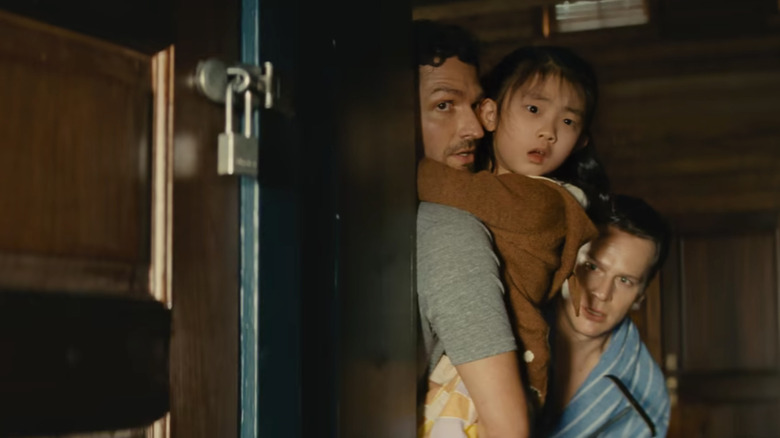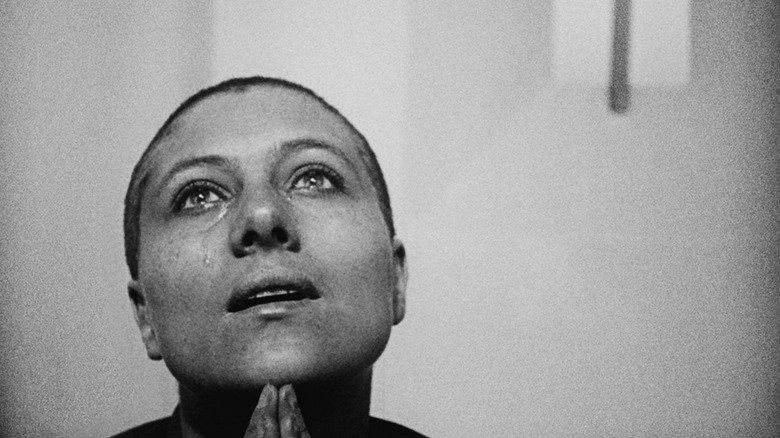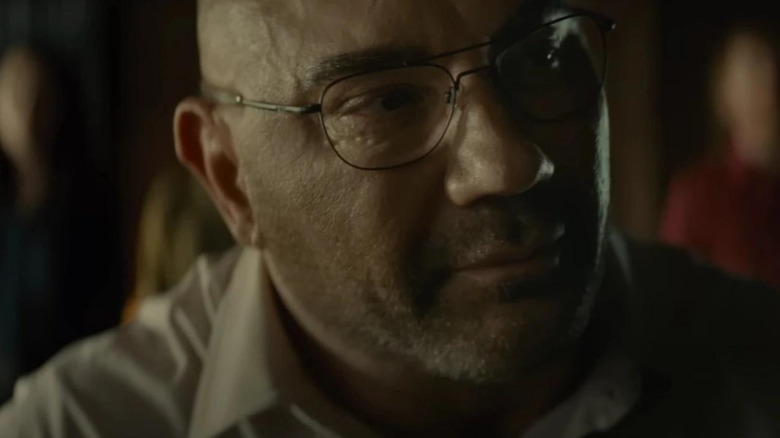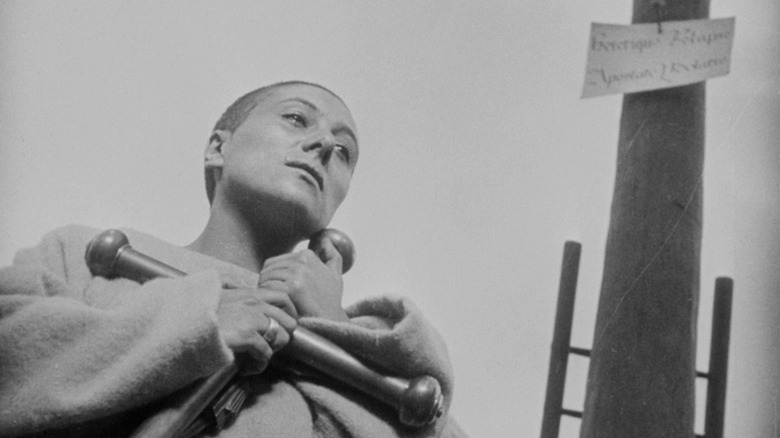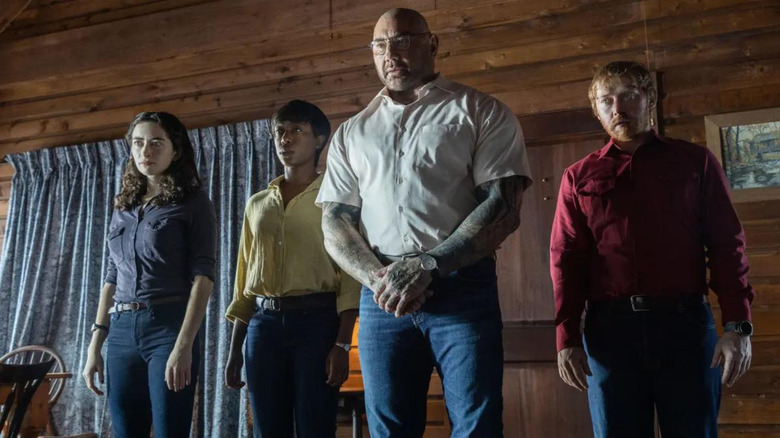M. Night Shyamalan's Knock At The Cabin Shares Some Fascinating Parallels With A Cinematic Classic
This piece contains major spoilers for "Knock at the Cabin."
"Knock at the Cabin" simultaneously feels like classic M. Night Shyamalan and something completely new for him. While he's certainly tackled difficult and heavy topics in his work before, none have arguably been as explicit about unexplainable acts of God as this one. It will certainly be a divisive piece of filmmaking, but is it really a Shyamalan movie if it isn't divisive?
One thing about the director, however, is that he has a poignant and genuine love for the medium of film. He's gone on record numerous times about his wide range of influences, and he's one of the few filmmakers who can take classic genre tropes and turn them into something uniquely compelling. "Knock at the Cabin" is no different, as it flips the home invasion thriller on its end by making its intruders not only sympathetic, but among the people able to stop the world from ending. While we can't 100% confirm the intention, there seems to be one film in particular that Shyamalan wanted to honor with his latest thriller: Carl Theodor Dreyer's 1928 silent classic, "The Passion of Joan of Arc."
Okay, yes, this sounds a bit absurd at first glance. However, the deeper you dive into both the technical and thematic aspects of both films, the more likely these parallels become. And no, we're not just talking about the most obvious and surface-level observations.
Touched by God, sacrificed for humanity
If you aren't familiar with the story of Joan of Arc, she claimed to have been visited by three biblical spirits to help bring France to victory during the Hundred Years War. While "The Passion of Joan of Arc" does not depict this spiritual encounter, it does revolve around the trial of Joan (Renée Falconetti) and how her captors question the legitimacy of her visions. In both her real life and the film, she is subsequently killed for her unwavering faith, saddened by the doom she believed humanity would endure because the message her saviors bestowed upon her was ignored.
The core idea of "Knock at the Cabin" is how one can come to terms with their own faith in times of crisis, but that faith isn't intrinsically religious. As we hear from one of the film's intruders named Sabrina (Nikki Amuka-Bird), she never believed in following a religion or abiding by the customs these institutions promote. That didn't prevent her, however, from receiving strange and distressing visions by some sort of higher power, thus leading her to the small Pennsylvanian cabin where the film takes place. Sabrina and her fellow intruders, led by the brooding and soft-spoken Leonard (Dave Bautista), all claim to have been chosen by something to carry out the film's impossible choice. Like Joan, they are burdened with the prospect of death if their message is denied by the family they've been forced to make their audience, and each of their deaths results in a worsening fate for humanity.
The distortion and heightening of humanity
"Knock at the Cabin" smartly avoids directly naming God or any other religious entity as the bestower of the apocalypse. Rather, it is an unknown entity that only reveals itself to one person — Eric (Jonathan Groff), who is vacationing in the cabin with his husband Andrew (Ben Aldridge) and daughter Wen (Kristen Cui). It'll be easy to assume that this entity is God, but its vagueness and lack of clarity means it is likely a broad personification of faith and belief.
Regardless, the way that this entity makes its presence known on a technical level is through the many close-up shots of the film's characters. Shyamalan told Collider in a recent interview that these close-ups are meant to represent the anxiety and pain all the characters are facing in "Knock at the Cabin" — after all, the family is being taken hostage by complete strangers, and those strangers are remorseful for having to do a job they believe they were chosen for.
"The Passion of Joan of Arc" is often considered an essential piece of film history for many reasons, with the most technical reason being its own usage of close-ups. By focusing on the faces of the characters, the film's cinematography mirrored the oppressive claustrophobia of Joan's imprisonment. Director Paul Schrader theorizes in his book "Transcendental Style in Film" that these close-ups distort and heighten those they capture, making the audience feel just as trapped as Joan. The jury is still out on whether Schrader would call "Knock at the Cabin" transcendental, but Shyamalan likely understands the impact that "The Passion of Joan of Arc" has on the close-up.
The unleashing of plagues and the ascension into paradise
As previously mentioned, the intruders of "Knock at the Cabin" have their own personal stakes in their divine mission. They accept that if they had to become a martyr for the world to be saved, so be it. With each rejection given by the family, each intruder dons a white bedsheet and recites the next curse before their comrades sacrifice them. Two executions, Redmond (Rupert Grint) and Adriane (Abby Quinn), go as planned, but as tensions flare up, the rest of them have to make some caveats. Regardless, all four of them are remorseful, and they are weeping as they face death, but they stand strong in their convictions as if this was their destiny.
Despite knowing that she was not committing hearsay as she was accused of doing, Joan in "The Passion of Joan of Arc" does not try and fight her way out of execution. Instead, she is eerily content with her fate, knowing that she did all she could to save the souls of France. That's why she, donned in a white sack, helps her executioner tie her to the stake. She softly cries as she burns alive, not because of her persecution, but because she accomplished the mission her guardian angels sent her to do.
The framing of sacrifice in both "Knock at the Cabin" and "The Passion of Joan of Arc" is not romanticized. Rather, they are condemnations of the audience watching these deaths play out. After all, those bearing witness could have saved these martyrs if they had listened.
Will I be with You tonight in Paradise?
Leonard, Sabrina, Adriane, and Redmond are not the evil beings that the family, particularly Andrew, wants them to be. However, as we see debated throughout "Knock at the Cabin," they are also not entirely good, either. That is why they were bestowed as the Four Horsemen of the Apocalypse, their designations unleashed onto the world once they are killed. This isn't dissimilar to how the guardian angels designated Joan as the savior of France and a saint in the making, as depicted in "The Passion of Joan of Arc." Both of these films are at least partially about being true to your convictions and faith, whether or not those have religious implications.
Are Dreyer and Shyamalan comparable filmmakers? Likely not, as seen in the drastic tones in their respective work. However, given the numerous parallels between his latest release and Dreyer's most famous film, it seems unlikely that Shyamalan would disregard "The Passion of Joan of Arc" as an inspiration. Even if that is the case for whatever reason, the fact that you can even readily compare a Dreyer and a Shyamalan film without having to look that deeply into either text is nuts. Both Dreyer's Joan and Shyamalan's chosen intruders made a choice to follow their gifted missions, and that alone makes for haunting cinema.
